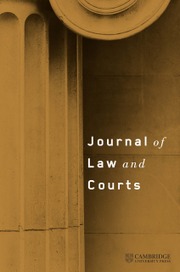Article contents
Timing Control without Docket Control
How Individual Justices Shape the Brazilian Supreme Court’s Agenda
Published online by Cambridge University Press: 21 October 2022
Abstract
The Brazilian Supreme Court has developed an informal mechanism of timing control: each justice has the power (pedido de vista) to request more time to study the files of a given case. In this article, we use a database of over 1.5 million cases to calculate vista request duration and compare vista behavior to other activities in which caseload and the justice’s efficiency play a role. Our results show that vistas can function as an individual power, unconstrained by the Court’s internal rules of procedure, to indefinitely remove cases from the agenda, in ways that cannot be explained by the Court’s workload. We also find initial evidence of the vistas being used for strategic purposes, when justices wait for a case to be decided in a more favorable composition or political context. These results suggest that comparative analyses of courts should look beyond formal rules of docket control to study informal means of delay.
- Type
- Research Article
- Information
- Copyright
- © 2017 by the Law and Courts Organized Section of the American Political Science Association. All rights reserved.
Footnotes
Earlier versions of this article were presented in the conference “Empirical Studies on Constitutional Courts,” FGV Direito Rio, May 28, 2014, in Rio de Janeiro, Brazil, as well as in the Stanford International Junior Faculty Forum, October 11, 2014, in Stanford, CA, USA. We would like to thank Lee Epstein, Barry Friedman, Andrew Martin, Clifford Carrubba, Catalina Smulovitz, Julio Rios Figueroa, Paulo Furquim, Oscar Vilhena, Rogelio Perdomo, Gillian Hadfield, Anupam Chander, Setsuo Miyazawa, and Lawrence Friedman for the helpful debates in these two events. We are also thankful to Fernando Fontainha for sharing and discussing with us the results of the Oral History of the Supreme Court project at FGV Direito Rio; to Daniel Chada, for his crucial role in the development of the software that identified and gathered information on all the pedidos de vista; to Gabriel Dias, who made extensive checks on hundreds of cases to help improve the software; to Evan Rosevear, Thomaz Pereira, Leandro Ribeiro, Gregory Michener, and Miguel de Figueiredo for their helpful criticisms and suggestions to earlier versions of this article; and to the anonymous reviewers from the Journal of Law and Courts for their criticisms and suggestions.
References
- 20
- Cited by


